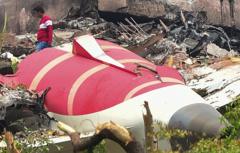The Air India Boeing 787 crash that resulted in over 270 fatalities has prompted India's aviation authorities to deliberate on whether to send the flight data and cockpit voice recorders overseas for analysis, amid concerns over their condition post-accident.
**India Reviews Overseas Analysis of Air India Crash Flight Recorders**

**India Reviews Overseas Analysis of Air India Crash Flight Recorders**
India's aircraft investigation team weighs options on decoding black boxes after tragic crash, leading to heightened scrutiny of aviation safety.
India's Aircraft Accident Investigation Bureau (AAIB) is in the process of determining if the flight data and cockpit voice recorders from the Air India Boeing 787-8 Dreamliner crash will be sent abroad for decoding. The incident, which occurred shortly after takeoff from Ahmedabad airport last Thursday, claimed the lives of at least 270 people. Despite reports suggesting the black boxes would be dispatched overseas, the Ministry of Civil Aviation has confirmed that a decision is pending.
The AAIB is set to carefully assess technical, safety, and security factors before finalizing where the recorders will be analyzed. Both sets of Enhanced Airborne Flight Recorders (EAFRs) have been recovered from the crash site. Their precise data can reconstruct the flight's final moments and provide crucial insights into the crash's cause. However, as media outlets reported damage due to the fire following the crash, extracting usable data in India could be challenging.
Captain Kishore Chinta, a former AAIB investigator, has suggested that one set of recorders might be sent to the US for comparative analysis with data processed by the National Transportation Safety Board (NTSB). Though a new AAIB facility was inaugurated in Delhi, its operational status for EAFR downloads remains uncertain.
In a related response to the tragedy, Air India's chairman revealed that one engine of the crashed aircraft was new and maintained a clean record, while inspections on 26 out of 33 of its Boeing 787 fleet have been completed and cleared for service. Following the incident, the aviation regulator ordered enhanced safety measures, leading to reduced flights on 16 international routes and a temporary suspension on three destinations from June 21 to July 15. The adjustments are part of a strategy to implement additional pre-flight checks and accommodate airspace modifications in the Middle East.






















